Why do you think the power of political protest has declined?
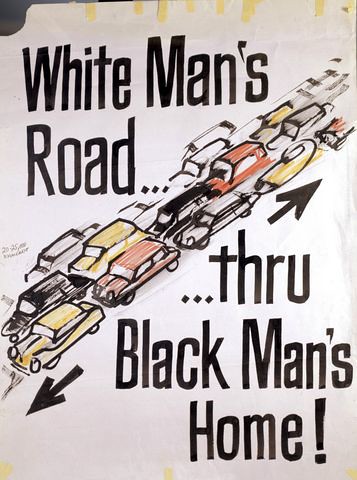
Section from an Anti-freeway protest poster, Emergency Committee on the Transportation Crisis, Washington DC, circa 1960s.
I am doing some filing of stuff (clippings, etc.) that piled up around the house while I was working in Baltimore County, and I came across this piece, "Power of protest on the wane," from the Baltimore Sun.
My first job in DC was an an assistant to the director (and later I was marketing director) of the Center for Science in the Public Interest, a consumer advocacy group focused mostly on nutrition and advocacy policy. The group militantly denied that it was a "Nader Group" even though the founding directors all met while working for Ralph Nader. They were scientists with PhDs and they bristled having to take orders from lawyers...
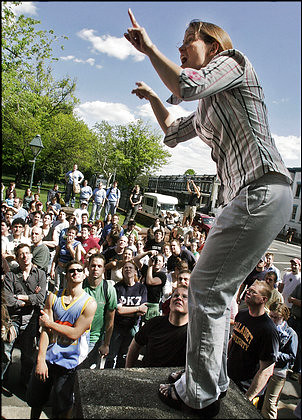
Gallaudet announces it's new choice for President, and much of the student body holds a rally at the front gate to protest that choice. Pictured, Alumnus Tawny Holmes, last year's student body government president, addresses a crowd of students that has gathered at the Florida avenue entrance to campus. 2006 Washington Post photo by Bill O'Leary.
Back then, you could send out a press release and hold a press conference and you would get coverage by the local newspapers and media, as well as from some of the Washington bureaus of the national media.
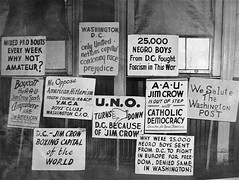
Protest Signs, Campaign to integrate Uline Arena, (1948-49).
Now, it was a bit easier for CSPI than for a typical advocacy group for at least two reasons (1) everybody eats, so they have somewhat of an interest in food and they'll pay attention; (2) newspapers have food and/or health and science sections, there are magazines dedicated to health and food issues, television news covers food and health issues, and back then there even used to be "consumer" beats at some newspapers (notably the New York Times and the Washington Post, although the New Orleans Times-Picayune had a great daily column too) and local television stations, such as Roberta Baskin at WRC-TV (Channel 4 in DC) and Lea Thompson at WJLA-TV (Channel 7 in DC.
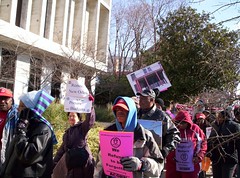
Hurricane Katrina related ACORN Protest, near Hart Senate Office Building (Independence Ave. NE).
The times have changed considered since then. As the media outlets have gone through repeated personnel reductions they have fewer reporters to cover stories. And that makes it a lot harder to get attention.
At the same time, I have a sense that they don't care either.
The web and blogs and social media do make a difference in terms of local organizing. But at the same time, you need to be able to reach and communicate through traditional media, in order to reach broader audiences, rather than only the zealots.
I do have a fair amount of interaction with journalists still, because the blog and my activism and the reasonably objective way I write lend me credibility. Sometimes I make it into a story through a quote, sometimes I don't but I provide background on the issues at hand and take them on tours of various places.
And I will write to journalists/media outlets when I have something to say (positive or negative) about the stories or coverage -- which sometimes you also read about in the blog. E.g., I have noticed a distinct difference for the better in the word choice and headlines in stories by Markham Heid of the Examiner after I wrote a blog entry about the unobjective and leading word choices frequently present in his articles. Sometimes that includes letters to the editor, one of which will be in the Washington Business Journal this Friday.
But for people who are less articulate or quick with a blog post or who haven't spent years working on issues, or for those organizations working on particularly challenging causes, what are we supposed to do? How are we supposed to get access when despite all the outlets, audiences are shrinking at the same time they are growing?
And how are we supposed to make change happen?
Resources:
- Making Local News, about television news, by Phyllis Kaniss
- Inventing Reality: The Politics of News Media, by Michael Parenti
- The Whole World Is Watching: Mass Media in the Making of the New Left, this is the reworking of Todd Gitlin's dissertation, which was about the impact of mass media on the operations of the Students for a Democratic Society, both internally within the organization, and externally in how they were perceived by people reading and seeing tv stories about them.
- I have a bunch of books by Robert McChesney too (typically about how the broadcast industry shifted from a community focus to an entertainment one, delivered by corporate media organizations rather than locally organized outlets), plus there is always the writings of Noam Chomsky and Edward Hermann
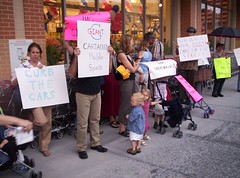
Neighborhood protest against the creation of a lane for cars on the sidewalk of Park Road in front of the Giant Supermarket at Tivoli Square in Columbia Heights. Eventually, Giant and Horning Brothers Development Corp. backed down and removed it.
Labels: civic engagement, media and communications, protest and advocacy



0 Comments:
Post a Comment
<< Home